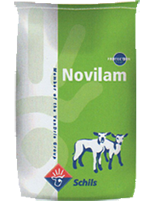Rearing Lambs
Every year most farmers will have some surplus lambs due to multiple births or ewe dying which will lead to lambs needing to be artificially reared. There are many things to look at which can help you successfully rear strong healthy lambs this season.
Colostrum
Colostrum is vital for improving immunity and reducing disease. Ensure that Lambs have received adequate colostrum ideally within the first 2 hours of birth. The sooner colostrum can be given to lambs after birth the better as this is when they will receive the most benefit from the colostrum and early absorption of antibodies. Lambs must rely on antibodies through the colostrum as sheep do not pass antibodies across the placenta before birth.
With a newborn lamb, within the first 24 hours we would recommend that they receive 200ml/kg of bodyweight so a 4.5kg lamb would receive 900ml of colostrum.
Decide which feeding system is best for you.
Traditionally most lambs are bottle fed although this can be very time consuming. There are alot of farmers who now use ad lib bucket feeding, and in recent times there has been a large increase in machine feeding. It all comes down to how many lambs you will be feeding and to weigh up which method works best for you on your farm.
Ad lib bucket rearing saves time and labour and several lambs can be fed at once, and these buckets are readily available and cost effective. As they are ad lib you will find lambs will drink freely which usually promotes faster growth rates.
Automatic feeders are more expensive though will pay dividends over a period of time. Again as the lambs can feed when they want, you will see improved growth rates and as they usually will feed little and often this usually reduces the risk of digestive upsets such as scour and bloat.
It is important with both ad lib bucket feeding and machine feeding that the upmost care in hygiene is taken, as if the buckets/machines are not cleaned thoroughly and frequently they can spread disease throughout the heard.
Milk Replacer:
Choose a high spec milk replacer such as our Novilam which has a complete package of ingredients and nutrients to fulfil your lambs complete dietary needs. It also includes an anti bloat / anti scour package to keep the lambs healthy.
- Usually an average lamb will use 10-12kg of milk powder.
- To start with we would recommend 1L of milk split into 4 to 5 feeds a day. Once a lamb is confident and trained in drinking they then can be moved onto machine/bucket ad lib which usually takes 2-3 days.
- Recommended feeding rates are 200g of powder to 800ml of water which completes a 1L bottle.
- Ensure you are using a measure or scales to check that you are accurately weighing out the correct amount of powder
- Initially try to have the milk at a mixing and feeding rate of 39 degrees. Mixing milk powder in high temperature water will increase the risk of damaging the nutrients and proteins in the milk.
- Make sure there is plenty of clean dry bedding and enough good ventilation above lamb height
- Lambs should always have access to fresh water from day one.
- Add some roughage such as dry straw/hay in a rack
- Have access to creep feed, usually you will not see the intake go up until week 3/4.
- Make sure to clean all feeding utensils after each feed to reduce the risk of spreading disease.
- Lambs should be a minimum of 35 days old / or 2.5 times their birthweight (9-10kg), as well as eating 250g of solid feed per day
If you would like anymore information on our lamb milk replacers please contact us through our contact us page or via email at eringoldltd@hotmail.com
